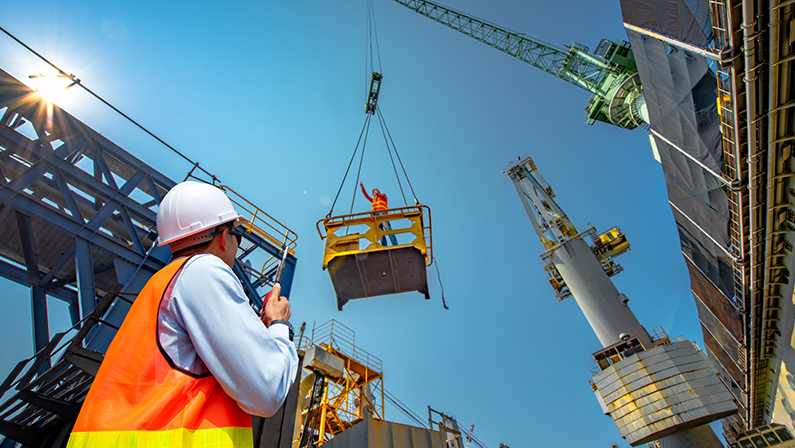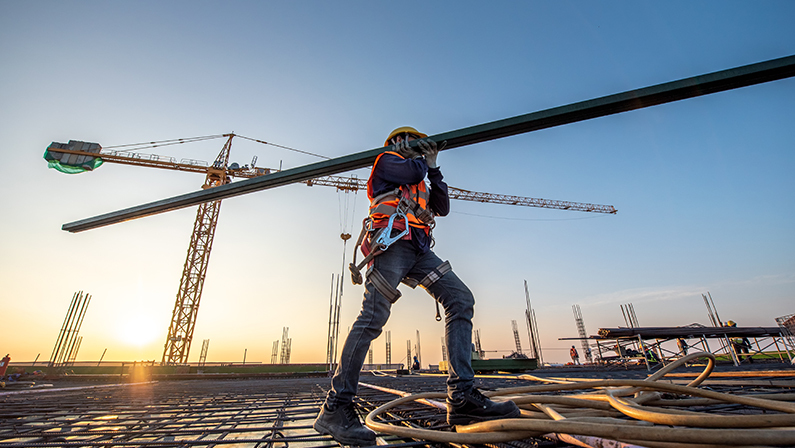Secure Your Build: The Essential Guide to Insurance for Construction Companies
The construction industry faces unique challenges and risks, making comprehensive insurance coverage not just a necessity but a cornerstone for success. From unforeseen delays to accidents on the job site, having the right insurance policies in place can be the difference between a minor setback and a major financial loss.
What are construction project risks?
Every construction project, regardless of its scale, is susceptible to a range of risks. These risks can significantly impact the project's timeline, budget, and overall success. From the initial blueprint to the final touches, potential issues lurk at every stage, making it crucial for companies to identify, understand, and mitigate these risks effectively.
Here are some of the most common risks you need to consider:
Construction or design defects
These flaws can stem from errors in the project's planning phase or during the actual construction. Defects may include structural failures, use of substandard materials, or non-compliance with building codes. All of these may lead to safety hazards, costly repairs, and legal disputes.
Delays
Delays are also a common risk in construction projects. They may be caused by factors such as adverse weather conditions, labor shortages, or supply chain disruptions. These delays not only extend the project timeline but can also escalate costs and strain relationships with clients.
Equipment damage and theft
Construction sites are often targets for theft, and equipment can also be damaged due to accidents or mishandling. The loss or damage of crucial machinery can halt construction activities, leading to downtime and increased project costs.
Worker and third-party injuries

The construction sector is inherently risky. Construction sites come with a high potential for injuries to workers or third parties such as visitors or passersby. Accidents can result in significant medical expenses, legal liabilities, and damage to the company's reputation.
What is construction insurance?
Construction insurance is a specialized form of coverage designed to protect construction companies, contractors, and project owners against the unique risks and liabilities inherent in the construction industry—from property damage and equipment theft to worker injuries and third-party liabilities.
Essentially, insurance for a construction company or construction business insurance acts as a safety net, ensuring that unforeseen incidents can hurt your business or construction project. If something goes wrong, like a delay because of bad weather, or if someone sues because of an injury, this insurance helps cover the costs, so your business doesn't have to bear the financial burden alone.
What are the types of construction insurance?
Whether it's a sudden accident on-site or legal issues that pop up out of nowhere, having the right insurance is essential. Here are the most common types of construction insurance that keep your projects running smoothly and safeguard your business against unexpected setbacks:
General liability insurance
Protects against third-party claims of property damage or bodily injury, a fundamental coverage for any construction company.
Workers' compensation insurance
Covers medical costs and lost wages for employees injured on the job, ensuring compliance with state regulations.
Commercial auto insurance
Provides coverage for vehicles used in business operations, from transporting materials to moving equipment.
Builder's risk insurance
Also known as course of construction insurance, this covers buildings under construction against damage or loss.
Contractor’s tools and equipment insurance
Building contractors insurance offers protection for the tools and equipment used by contractors, covering theft, damage, or loss.
Professional liability insurance
Shields against claims related to errors in the professional services provided, such as design flaws.
Who needs construction insurance?

Construction insurance is essential for anyone involved in the construction industry, from small contractors to large construction companies. This includes general contractors, subcontractors, property developers, and even architects and engineers who play a role in the construction process. The reason is simple: construction work comes with inherent risks, such as property damage, accidents on site, delays, and professional errors, all of which can result in significant financial losses.
Having the right insurance coverage helps mitigate these risks, ensuring that businesses can recover from setbacks without devastating financial consequences. Whether you're overseeing a major development project or carrying out routine renovations, construction insurance provides a safety net that protects your business, employees, and assets, making it an indispensable part of operating in the construction sector.
Construction Insurance Requirements
Construction insurance requirements vary depending on the location, the size and scope of the project, and the specific roles of individuals or entities involved. Generally, local and state regulations dictate minimum insurance coverages needed to operate legally within the construction industry. These often include carrying general liability insurance to protect against third-party injury and property damage claims, as well as workers' compensation insurance to cover employees in case of work-related injuries or illnesses.
For specific projects, contractors may be required to hold additional policies such as builder's risk insurance to cover the property during construction and professional liability insurance for design and engineering professionals. Commercial auto insurance is also a requirement if the company uses vehicles for transporting materials or employees. On top of regulatory requirements, clients or project owners often set their own insurance criteria, stipulating certain coverages or limits as part of the contract to ensure their project is adequately protected.
It’s best to talk to a trusted advisor or a construction insurance broker for more information about what your construction project needs and what you have to prepare for a construction insurance policy.
How much does construction insurance cost?
The cost of construction insurance varies widely based on several factors:
Factors that Affect the Cost of Construction Insurance
When we talk about what drives the cost of construction insurance, we're looking at everything from the size and type of projects you take on to where they're located. If you're working in an area with lots of natural disasters or in a city where lawsuits are more common, you might see your costs go up. The history of safety incidents your company has (or hasn't) also comes into play, as does how much coverage you decide you need.
Average Cost of Construction Insurance
Costs can vary widely. General liability insurance might cost a few hundred to several thousand dollars per year, depending on your specific risk factors. Workers' compensation insurance is another variable beast, with costs influenced by your state's regulations, your payroll, and the nature of the work.
Builder's risk insurance is more straightforward, generally costing about 1% to 4% of the total project value. However, the specific details of your project can shift this percentage. The best move to accurately pin down your construction insurance costs is to get a personalized quote that considers all these factors so you get the right coverage at the right price for your business.
Surety bonds for construction and contractors
Construction projects are fraught with potential risks—unexpected delays, accidents on the site, or even design errors can significantly derail a project. Surety bonds serve as a financial guarantee, ensuring that contractual obligations are met, projects are completed as agreed, and all involved parties are fairly compensated.
They provide a layer of security and trust, ensuring that, despite the inherent uncertainties of construction work, there is a mechanism in place to uphold commitments and maintain project integrity.
Types of Surety Bonds
Surety bonds offer various types of protection to ensure projects run smoothly and according to plan. Each type of bond serves a specific purpose, safeguarding different aspects of construction activities and financial responsibilities.
The most common types include:
License Bonds and Permit Bonds: These act as the first line of defense, ensuring that contractors adhere to local laws and regulations. Obtaining one of these bonds is often a prerequisite for starting a project or securing a permit. They serve as evidence of a contractor's dedication to compliance and ethical practices.
Bid Bonds: Essential during the bidding phase, bid bonds provide a guarantee that contractors will honor their bid price and sign the contract if they win the project. This mechanism filters out non-serious bidders, ensuring only committed contractors move forward.
Performance Bonds: Focused on the execution phase, performance bonds guarantee that contractors will complete the project in accordance with the contract's terms. Should the contractor fail to meet these obligations, the bond offers financial protection to the project owner.
Payment Bonds: These bonds ensure that contractors fulfill their financial responsibilities to subcontractors, laborers, and material suppliers. Payment bonds are crucial for maintaining fairness and timely compensation within the construction workforce.
Fidelity Bonds: While not exclusive to construction, fidelity bonds provide an additional layer of financial security, protecting against fraudulent activities by employees. In the context of construction, they help safeguard project funds from potential internal theft.
Cost of Surety Bonds
The cost of securing a surety bond varies. It is mostly influenced by the bond type, the total bond amount, and the contractor's financial stability and credit history. Generally, contractors pay a premium that’s a percentage of the full bond amount, which can range from less than 1% to 15% or more, depending on the risk assessed by the bond issuer.
Understanding these costs upfront by talking to an experienced advisor from a construction insurance agency or insurance company for construction can help contractors and project owners budget accordingly and ensure all necessary protections are in place for successful project completion.
Finding the Best Construction Insurance Companies

The search for the ideal insurance companies for construction or the right insurance for construction contractors is similar to laying the foundation for a skyscraper—it needs to be done with precision, care, and an eye for detail. The best insurers in this space understand the unique challenges of construction. They offer tailored policies that cover everything from general liability to workers' compensation.
When evaluating potential insurers, consider their track record in handling claims, their financial stability, and their understanding of construction-specific risks. It's also wise to seek out companies that offer flexible policy options and can provide insightful risk management advice, ensuring you're covered from every angle.
Building a Secure Foundation with Hotchkiss Insurance
To start protecting your business or construction project, talk to an expert from a trusted insurance company like Hotchkiss Insurance today. Hotchkiss Insurance provides a solid solution for construction companies seeking straightforward and effective insurance options.
With a focus on the specific needs of the construction sector, Hotchkiss Insurance offers a variety of customized insurance policies designed to address the unique challenges construction businesses face. From general liability insurance to workers' compensation and builder's risk insurance, their products are aimed at offering complete protection.
Partner with Hotchkiss Insurance and access the necessary support so you can make informed insurance decisions for your peace of mind.